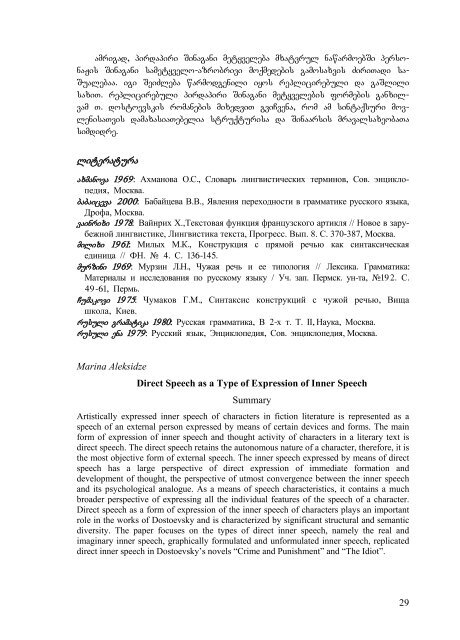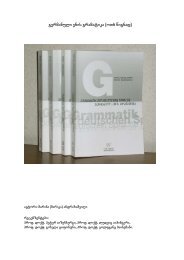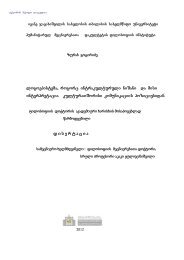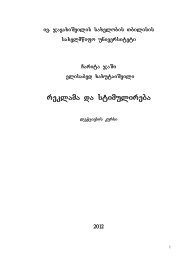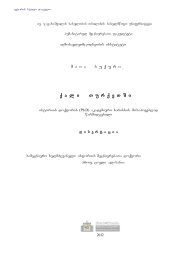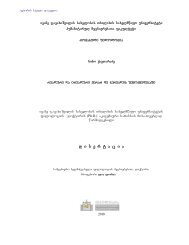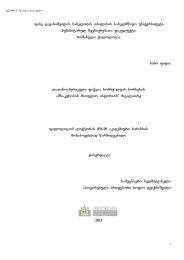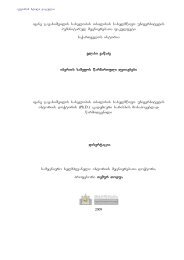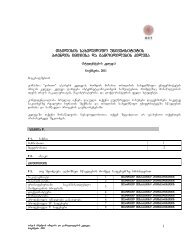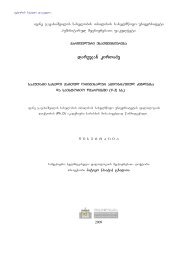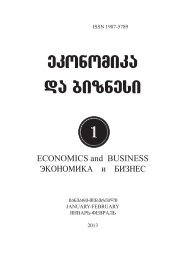- Page 1 and 2: ivane javaxiSvilis saxelobis Tbilis
- Page 3: krebuli eZRvneba jemSid giunaSvilis
- Page 6 and 7: 1974 8. Краткий русско
- Page 8 and 9: 13. K толкованию терм
- Page 10 and 11: 1982 43. Историческая
- Page 12 and 13: 12 2002 68. islamuri reglamentacia
- Page 14 and 15: 19. Alefbāye Gorgài , Tehrān, 13
- Page 16 and 17: nawerTa erovnul centrSi (www.manusc
- Page 18 and 19: turul arealSi Semavali qveynebis en
- Page 20 and 21: marina aleqsiZe 20 enaTmecnierebis
- Page 22 and 23: yvani nawilia avtoris remarka, mas
- Page 24 and 25: terminiT `dialoguri replika~ ki - p
- Page 26 and 27: "Ведь вот, _ подумал
- Page 30 and 31: fati anTaZe-malaSxia 30 enaTmecnier
- Page 32 and 33: ||„ziraki~ (neimani 1978); „zir
- Page 34 and 35: nasesxeb erTeulebs, magaliTad, zemo
- Page 36 and 37: dasturdeba „visramianSic~: „dia
- Page 38 and 39: ki spontanurad Cndeboda Targmnis pr
- Page 40 and 41: ikatizaciis tendenciis TvalsaCino m
- Page 42 and 43: Sah-name 1934: firdousi „Sah-name
- Page 44 and 45: naTia arabuli 44 enaTmecnierebis sa
- Page 46 and 47: mkveTrad SemosazRvruli, rac mis nak
- Page 48 and 49: isas: ‘xexilis gasxvla’, ‘xex
- Page 50 and 51: kiTxva ratom damebada, zustad ar ma
- Page 52 and 53: avSvebs vTxovT: calke gadade yvela
- Page 54 and 55: 2. meore eqsperimentis Sedegebi inf
- Page 56 and 57: am formuliT gadaTvlili monacemebis
- Page 58 and 59: akaki, 6 wlis, hyavs 2 ufrosi da, d
- Page 60 and 61: • eqsperimentebis Sedegebze, rogo
- Page 62 and 63: krofti, kruzi 2005: u. krofti, a. k
- Page 64 and 65: lime wevris logikuri gamokveTis miz
- Page 66 and 67: (15)-Si rom aucilebelia, gansakuTre
- Page 68 and 69: 23. mu (r)en, na Warums? ra aris, r
- Page 70 and 71: • It is not expected to find a pr
- Page 72 and 73: sulSi ganxorcielebula da arc axla x
- Page 74 and 75: iseT enebSi, sadac ar aris warmodge
- Page 76 and 77: Tomsenis mosazreba, romlis Tanaxmad
- Page 78 and 79:
Semoklebebi 1p _ pirveli piri 3p _
- Page 80 and 81:
Shemirān. 1 Its chapter on Shemir
- Page 82 and 83:
“when”, ofdâ- “fall”, dâ
- Page 84 and 85:
Note also min “in the middle“ a
- Page 86 and 87:
occasionally in formal Persian, e.g
- Page 88 and 89:
Kāš. vâred migedian “they woul
- Page 90 and 91:
“go” from Persian, it caused th
- Page 92 and 93:
of A.D. 1679), and m (= H 2135, of
- Page 94 and 95:
When initial *u» was followed by a
- Page 96 and 97:
of course, that Persian is well equ
- Page 98 and 99:
compound *šāhāØnduxt. ‘daught
- Page 100 and 101:
pirad; 3. LXX: angelozi; 4. warmarT
- Page 102 and 103:
1.6. sainteresoa angeloz-is xmarebi
- Page 104 and 105:
2.1. ebr. birK, bWrK, ~ybirK.h;;; b
- Page 106 and 107:
gansxvaveba am sityvebiT aRniSnul c
- Page 108 and 109:
mark. 1.13 da iyo mun ormeoc dRe da
- Page 110 and 111:
weldaRma _ virTasa ZAB. ese ars, ro
- Page 112 and 113:
eSmakis simbolo, eSmakis Zala trans
- Page 114 and 115:
gan TWsTa qvisa mis mcirisa SurdulT
- Page 116 and 117:
Hatch E., Redpath H.A., A Concordan
- Page 118 and 119:
*mai{a-, кл. перс. me{, др.
- Page 120 and 121:
имеет значение "вой
- Page 122 and 123:
Таково тадж. sano~ 1) "б
- Page 124 and 125:
Morgenstierne 2003: Morgenstierne G
- Page 126 and 127:
a. silagaZe e.w. standart-enis Sesa
- Page 128 and 129:
tradiciuli - klasikuri arabuli gram
- Page 130 and 131:
marine ivaniSvili 130 enaTmecniereb
- Page 132 and 133:
eWvoa; ufro savaraudoa, semituri fu
- Page 134 and 135:
В.Б. Иванов 134 enaTmecnier
- Page 136 and 137:
древнеперсидском и
- Page 138 and 139:
Второго сближения (
- Page 140 and 141:
В своей работе, пос
- Page 142 and 143:
vaxtang imnaiSvili 142 enaTmecniere
- Page 144 and 145:
gabriel mcire `gabriel mcires origi
- Page 146 and 147:
гда не работал с те
- Page 148 and 149:
le~ Zalze iSviaTad ki `mefe Tamaric
- Page 150 and 151:
Vakhtang Imnaishvili One Specific C
- Page 152 and 153:
enis codnis xarisxi, rogorc momaval
- Page 154 and 155:
i saintereso suraTs gvixatavs migra
- Page 156 and 157:
aSi ar dasturdeba rigi enobrivi mov
- Page 158 and 159:
deSerievi, protCenko 1972: Деше
- Page 160 and 161:
Gilbert Lazard 160 enaTmecnierebis
- Page 162 and 163:
Il est intéressant de constater qu
- Page 164 and 165:
vladimer lekiaSvili 164 enaTmecnier
- Page 166 and 167:
diqotomiis _ apriorizm-aposterioriz
- Page 168 and 169:
nebis epoqaSi abstraqtul obieqtebze
- Page 170 and 171:
170 enaTmecnierebis sakiTxebi _ 201
- Page 172 and 173:
isic unda iTqvas, rom rusuli ena as
- Page 174 and 175:
qeTevan megreliSvili 174 enaTmecnie
- Page 176 and 177:
176 da Tu varskvlavi samarTals ar m
- Page 178 and 179:
semantikurad axlos dgas qarTul gamo
- Page 180 and 181:
no z. sarjvelaZis mier ganmartebuli
- Page 182 and 183:
expressions are derived from tāvā
- Page 184 and 185:
qarTvelur da kavkasiis sxva enebSi
- Page 186 and 187:
186 saerTo- qarTveluri Zveli qarTul
- Page 188 and 189:
dawyebuli araharmoniuli kompleqsebi
- Page 190 and 191:
distanciuri mimdevrobebis mixedviT
- Page 192 and 193:
2. decesiur distanciur kombinacias
- Page 194 and 195:
svanurSi ki rusuli yruebi ufro xSir
- Page 196 and 197:
xevis dawyebamde periodis saSualo g
- Page 198 and 199:
iTadi toniT an maRali toniT. magali
- Page 200 and 201:
literatura 200 skdoma _ Burst ubger
- Page 202 and 203:
Georgian and in the dialects of Sva
- Page 204 and 205:
fatikuri~. glotalizebuli saxiTaa is
- Page 206 and 207:
amgvarad, xSulTa sistema yvelaze me
- Page 208 and 209:
amgvari minimalurad gansxvavebuli f
- Page 210 and 211:
Marina Meparishvili Modified System
- Page 212 and 213:
zian“ (TaziaTa meTauri, xelmwife)
- Page 214 and 215:
leba iqna Setanili TqmulebaTa perso
- Page 216 and 217:
maia saxokia 216 enaTmecnierebis sa
- Page 218 and 219:
1. erTi da igive morfologiuri forma
- Page 220 and 221:
i masdarebi da zogadad ie ormagi ak
- Page 222 and 223:
(Acc/Loc/Gen/Dat). xolo farTo tipol
- Page 224 and 225:
sazRvreba rogorc eqsperienceri (grZ
- Page 226 and 227:
dominirebs e.w. specializebul akuza
- Page 228 and 229:
zmnebi da paronomaziebic: „aqleme
- Page 230 and 231:
paralelebis SemTxvevaSi ki vlaparak
- Page 232 and 233:
Zvelsparsul warweraTa masalaze mosa
- Page 234 and 235:
234 tabula 1 tabula 2
- Page 236 and 237:
kempfi 1973: Kempf E., Semantic sco
- Page 238 and 239:
saxokia 2010d: m. saxokia, aqemenid
- Page 240 and 241:
Agency (SergAgObl); 5. The Adverbia
- Page 242 and 243:
Texte géorgien Un bifolio originel
- Page 244 and 245:
Sonja Gippert-Fritz 1. Anthroponyme
- Page 246 and 247:
Dzan ist in dieser Form im Ossetisc
- Page 248 and 249:
im Namen Dzynga vor, der das osseti
- Page 250 and 251:
tischer Männername im Gedenken an
- Page 252 and 253:
Westkaukasischen, das innerhalb der
- Page 254 and 255:
Eines der produktivsten Elemente is
- Page 256 and 257:
verschiedenenorts im Kaukasusgebiet
- Page 258 and 259:
gvevlineba. reprezantaciis anu samy
- Page 260 and 261:
am mxriv teqstebis funqcionalobis m
- Page 262 and 263:
• semantikuri mimarTebebis gaaqti
- Page 264 and 265:
Gardt 2007: Gardt Andreas, Diskursa
- Page 266 and 267:
uli bgeris Seswavlis ori aspeqti: f
- Page 268 and 269:
maSin rodesac wina poziciaSi T-s so
- Page 270 and 271:
feriuli arabuli dialeqtebis xangrZl
- Page 272 and 273:
gamomxatveli, xolo, meore mxriv, mr
- Page 274 and 275:
eduqciis xarjze klasikuri sistema g
- Page 276 and 277:
zÝkÁt z - -Át mdedr. mr. ziklÆn
- Page 278 and 279:
278 II mamr. âÁribak mdedr. âÁr
- Page 280 and 281:
daskvna ganxiluli kvleviTi mimarTul
- Page 282 and 283:
qeTevan ZiZiguri 282 enaTmecnierebi
- Page 284 and 285:
aris sxvadasxva xarisxis cocxali an
- Page 286 and 287:
zevss warmosaxavdnen. am SemTxvevaS
- Page 288 and 289:
amrigad, losevi sityvis agebulebis
- Page 290 and 291:
magram 20-30-ian wlebSi berebis ume
- Page 292 and 293:
292 enaTmecnierebis sakiTxebi - 201
- Page 294 and 295:
gardauvali ausziehen (igive wegzieh
- Page 296 and 297:
hipipotaqsur konstruqciaTa saxeobeb
- Page 298 and 299:
marine ivaniSvili, mcenareTa saxele
- Page 300:
gamomcemlobis redaqtorebi: cira jiS


